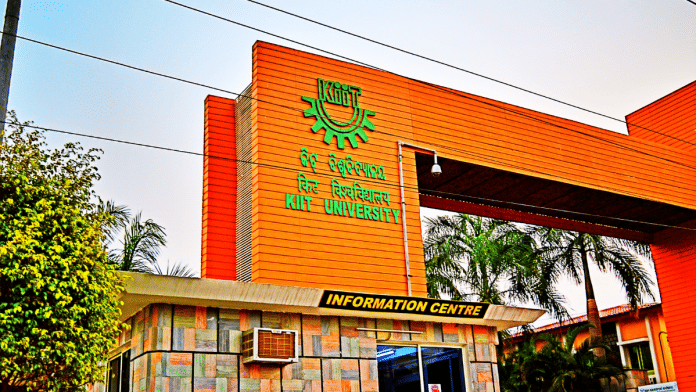New Delhi: A fact-finding report by the University Grants Commission (UGC) has squarely blamed the May suicide of a Kalinga Institute of Industrial Technology (KIIT) student, Prisha Shah, on the “unlawful” actions of the university. The UGC has also called for criminal proceedings against the university administration as well as Internal Complaints Committee (ICC) members involved in handling a sexual harassment case brought to the fore by KIIT student Prakriti Lamsal, who died by suicide earlier in February this year.
The consecutive suicides of two Nepalese students rocked the KIIT campus this year—third-year engineering student Prakriti Lamsal on 16 February and first-year BTech student Prisha Shah on 1 May.
Looking into the suicides, a UGC fact-finding committee led by Professor Nageshwar Rao has submitted the report, concluding that the university’s conduct amounted to criminal liability. “Instead of punishment, they (university) favoured the boy by pushing [for] forced illegal compromise with the girl. Later on, this led to suicide. The suicide case could have been averted. Members of the committee and senior administrative personnel of the university are liable for criminal punishment as per law,” the report has said.
Following the first suicide, that of Lamsal, Nepalese students protested against the university. However, the university responded to the protests with force, coercing students off the KIIT campus after issuing a “sine die” closure notice, with no future date fixed for the withdrawal of the notice. Security guards allegedly “manhandled” the protesting Nepalese students, escalating the crisis into a Nepal-India diplomatic issue.
The UGC report, now submitted to the Ministry of Education, investigated the circumstances leading to the suicides of the Nepalese students. It has highlighted grave lapses in crisis management, student welfare, and institutional governance at KIIT, held the university leadership accountable for the suicides, and recommended sweeping reforms.
Speaking to ThePrint, a KIIT spokesperson said, “KIIT-DU (KIIT Deemed to be University) is currently reviewing the contents of the report and analysing it thoroughly in its entirety. As a responsible institution, the university will take necessary steps to implement the recommendations in a time-bound and appropriate manner, in keeping with the highest standards of academic and administrative governance.”
Also Read: ‘No one can touch me’—Harassment charge against Krishna Kalpit shakes Hindi literary world
KIIT’s systemic failures
The UGC fact-finding panel has stated that the KIIT administration “needs to learn a lot,” considering its handling of Prakriti Lamsal’s sexual harassment complaints preceding her suicide. “This unlawful action of the university led to the suicide later on,” said the report.
Weeks before her suicide, Lamsal had twice reported serious allegations of sexual harassment against her peer, Advik Srivastava.
The report has further noted that the failure to address her allegations contributed to the second suicide of Prisha Shah, another Nepalese student at the university.
The report has found the university-constituted ICC to have failed in its duty of taking lawful action and conducting transparent investigations into the reported sexual harassment case.
Instead, the university had chosen an “illegal compromise” to settle the two complaints raised by Lamsal in the case, the report has stated, adding that the administration “prioritised the reputation of the university over regulations, law of the land, and international relations of the country”.
The report has also criticised KIIT administration’s use of “brute force” against students protesting Lamsal’s death while opting not to engage in dialogue. Calling the issuance of the sine die closure notice that forced Nepalese students out of their hostel “casual decision-making,” the report noted its adverse impact on India-Nepal bilateral relations.
The report also highlighted the gaps in the induction of Nepalese students, noting a lack of institutional protocols for orientation, cultural integration, or crisis support. It has highlighted poor hostel conditions, “substandard” facilities, and Nepalese and Indian students housed in one room, without any consideration for their cultural sensitivities.
The UGC has also flagged a disproportionate student intake relative to available infrastructure. “The existing hostels, classrooms, and welfare services are inadequate to accommodate the real intake,” its report stated.
KIIT’s actions & what UGC says
The UGC report has not only included the “action taken report” submitted by KIIT but also the subsequent recommendations by the fact-finding commission.
KIIT has maintained that it improved its grievance resolution mechanism, constituted a special grievance redressal committee for international students, and implemented a multi-tiered mental health support system, including partnerships with the Ministry of Education’s ‘Manodarpan’ initiative and the Ministry of Health and Family Welfare’s ‘Tele-MANAS’ programme.
The university has also claimed to have introduced “strict forensic handling protocols” and mandated “immediate forensic intervention and evidence preservation”. Furthermore, it has created specialised kitchen zones for international students to get culturally inclusive food.
However, the university has failed to satisfy the committee, which noted in its report, “The reforms appear largely theoretical, lacking timely and practical implementation.”
The UGC has ordered an academic audit, calling the 30,000-student population “excessive” compared to the existing infrastructure. It has called for a formal orientation for international students, the installation of lifts in the multi-story hostels, larger rooms for students, and culturally sensitive housing arrangements.
The fact-finding team has also recommended replacing the ceiling fans on the campus with wall-mounted fans, emphasising the need for transparency in handling crises such as suicides.
This report has been updated with the KIIT spokesperson’s response.
(Edited by Madhurita Goswami)






